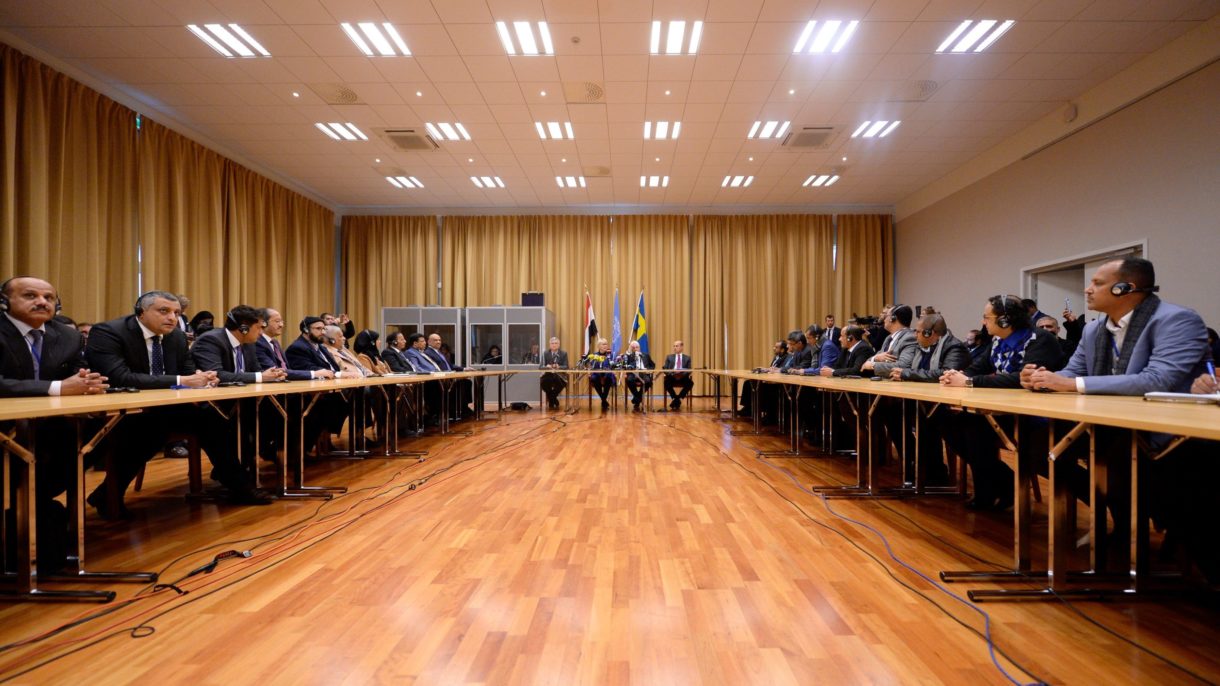Updated at 3:47 p.m. ET
For the first time in more than two years the Yemeni government and Houthi rebels are holding peace talks, with half of Yemen’s population facing starvation as a result of the civil war.
Representatives of both sides came face-to-face in a castle in Sweden.
The parley, mediated by the United Nations, was not expected to produce an immediate breakthrough.
“At the moment this is all about building confidence and setting the stage for bigger negotiations to take place next year,” NPR’s Ruth Sherlock reports.
The talks did begin on a positive note, though. Both sides agreed to a prisoner swap, which will involve the release of thousands of people. U.N. envoy Martin Griffiths described it as a hopeful start.
“The prisoner swap reportedly took months of work to secure,” Sherlock says. “Now Griffiths hopes to use these talks to agree on other confidence-building measures.”
Eventually, he hopes for a cease-fire around a key port or the reopening of an airport to allow resources to enter the country.
The civil war in Yemen, which began more than three years ago, has been devastating, with millions of people facing famine. Millions have also been displaced, and thousands of civilians have been killed.
Yemen is home to the world’s worst cholera outbreak, and hunger is a growing problem.
The U.N. estimates that a child under 5 dies in Yemen every 10 minutes.
The Houthi rebels, which hold the capital city of Sana’a, are backed by Iran. The Yemeni government is backed by the Saudi government, with U.S. support.
The Saudi-led coalition has carried out a campaign of airstrikes that have killed numerous civilians, including children. The United Nations believes some of those airstrikes may have been war crimes.
Coalition airstrikes have caused the majority of the direct civilian deaths in Yemen, according to the U.N. However, the Houthi rebels have also used indiscriminate weapons in urban areas, and both sides are accused of conscripting child soldiers.
The war has forced much of Yemen’s population to rely on aid groups for food. But the fighting also makes it difficult for aid groups to operate in the country. For months, the U.N. has issued urgent warnings about the growing risk of widespread, catastrophic famine.
As of December, 20 million people in Yemen are hungry, according to a press release on Thursday from UNICEF, the World Food Programme, the government of Yemen and the Food and Agriculture program of the U.N.
That release says that 70 percent of Yemen’s population is “food insecure,” and at least 250,000 are “barely surviving.”
“Any change in their circumstances, including any disruption in their ability to access food on a regular basis will bring them to the brink of death,” Lise Grande, humanitarian coordinator for Yemen, said in the statement.
On Wednesday, UNICEF issued a grim update on the fate of children in Yemen.
“The living conditions of millions of children in Yemen are a disgrace,” Geert Cappelaere, a UNICEF regional director, said. “There is no excuse for these dark realities in the 21st century. Wars, deep economic crises and decades of underdevelopment have not spared a single girl or boy in Yemen. The suffering of children is all man-made.”
Seven million children are going hungry, he said, while 400,000 “face life-threatening severe acute malnutrition and could die any minute.”
“Do these numbers — and the stories behind them — actually matter? They should have shocked the world into action long ago,” he said. “The interests of Yemeni children have hardly been taken into account in any decision-making for decades.”
In the U.S., politicians have recently been reassessing America’s support for Saudi Arabia’s strikes in Yemen, following the killing of Washington Post columnist Jamal Khashoggi.
9(MDEwNzczMDA2MDEzNTg3ODA1MTAzZjYxNg004))
